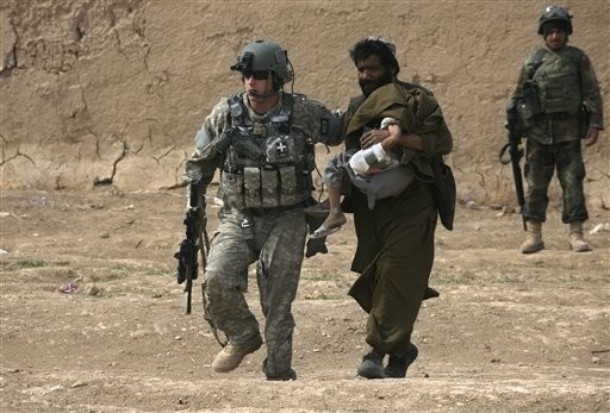
Rand's James Dobbins wades into the whither the Powell Doctrine debate:
Transformation, as pursued by the Rumsfeld Pentagon, had among its objectives the reduction of the size of the deployed force needed to accomplish any given taskâ??by trading manpower for firepower, mobility, and precision. The resultant Rumsfeld Doctrine, if it may be so called, was quite effective in standup battles against less well-equipped and less well-trained adversaries in both Afghanistan and Iraq. But the slimmed-down, high-tech forces initially deployed there proved grossly inadequate to deter the subsequent emergence of violent resistance movements and to defeating the resultant insurgencies.Both the Powell and Mullen doctrines provide guidelines of enduring value for the deployment and employment of the American military. Mullen certainly has not been arguing for the Vietnam-style incrementalism against which Powell was reacting 18 years ago; nor, one expects, would Powell argue today against the discriminate application of firepower that Mullen is advocating.
And both Mullen and Powell likely recognize that the American forces originally deployed in Afghanistan and Iraq were both too underwhelming in size and too indiscriminate in their application of firepower to achieve decisive results. From failed doctrines, at least there are lessons to be learned.
I would agree with the last line, but notice the lesson that is being learned here: that the U.S. failed in Iraq and Afghanistan because of a failed military doctrine.
But is there a military doctrine in existence that can create democratic governance and institutions in countries where none presently exist? Is there a military doctrine that can meet the ambitious state-building dreams of civilian policy-makers?
Even assuming the U.S. poured enough troops into Iraq to ensure security and keep a lid on any nascent Sunni insurgency, would civilian policy-makers have been able to construct the democratic Iraq they desired? I'm doubtful.
The lesson Washington seems to be learning from Iraq and Afghanistan is not that civilian policy-makers should set more modest goals and keep a higher-threshold on the use of military force but that next time, the military really should do a better job meeting the expansive vision of their civilian masters. And, if Admiral Mullen's speech is any indication, it seems the military agrees.
(AP Photo)











